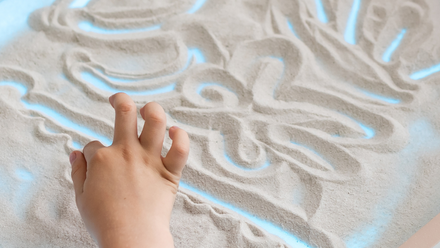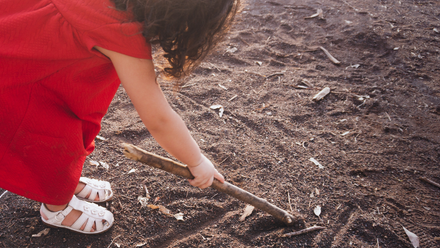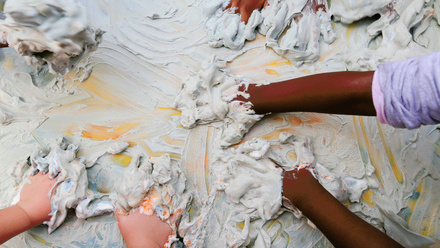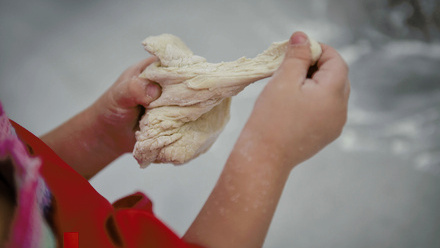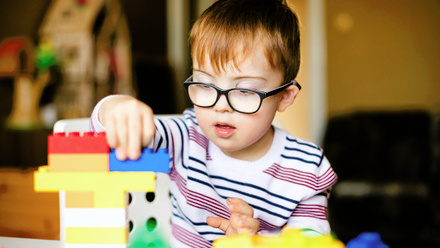The power of play
Play is a very misused adult word. To a child it is a way of life. To an adult it often means unimportant recreational things we do when we are not working.
Jean-Jaques Rousseau
Play is innate in us all. It is the most natural way for us to explore and learn throughout life, but especially during our formative years. We are primed for exploring, inquiring and experimenting with the environment around us; being in a space that nurtures these qualities is intrinsic to one that is playful too.
Whether it’s a newborn watching a starry sensory light, a 14-month-old splashing in the bath, a three-year-old rhyming made-up words on a long car journey, or a five-year-old learning the first rules of football, there is no replacement for play.. In fact, play is an important language that should be spoken throughout life.
Think about a positive childhood experience of your own. How playful was it? What feelings did it promote? Play is a vital aspect of healthy development as a joyful, open and accessible way to navigate the world.
Exploring the power of play
Let’s explore the power of play and how it gives us the foundations to grow. It keeps us engaged, it revitalises us, it helps to improve children's wellbeing and it boosts their capacity to learn in the early years.
The evidence is growing that play is essential to a child’s well-rounded development, so much so that it’s considered a human right. Whilst play is a universal experience that is considered inherent to the ways we grow and learn, it is also a unique and individual experience that means something specific to every one of us.
So how do we define play? It’s tricky, but play can be considered as “what children and young people do when they follow their own ideas, in their own way and for their own reasons”. It’s about natural inquiry, for which there is no external objective; it is all about following curiosity and promoting fun.
The power of play through different types of play
We know that children learn best when they are engaged and motivated, but there are a variety of ways we can use play, provoking different responses through their varied characteristics. There are many types of play that can be finetuned in a multitude of ways. Broadly speaking, however, 'types' of play are commonly thought about as six different types:
Unoccupied play
-
Starts at birth and continues through to around three months
-
Involves observing surroundings and experiencing senses
-
Includes erratic actions and involuntary experiences.
Examples include: waving hands at a toy, splashing water and kicking legs.
Solitary play
- Also known as independent play
- Starts at birth and continues through to two years and beyond
- Involves playing alone with little interest in involving others.
Examples include: building a tower with blocks, content to try again when it falls over, or taking themselves to the reading area and looking at books alone.
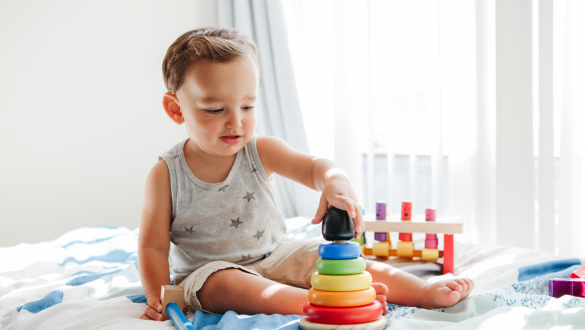
Onlooker play
- Starts at around two years
- Involves toddlers watching others play but not engaging or trying to join in.
Examples include: watching others during an activity or playing in a different area of the room. These children could be engaged in play alone or with others.
Parallel play
- Starts at around two years
- Involves children playing alongside others but not with them.
Examples include: making food in the roleplay area whilst another child uses the roleplay area to create a shop. They are in their own ‘bubbles’.
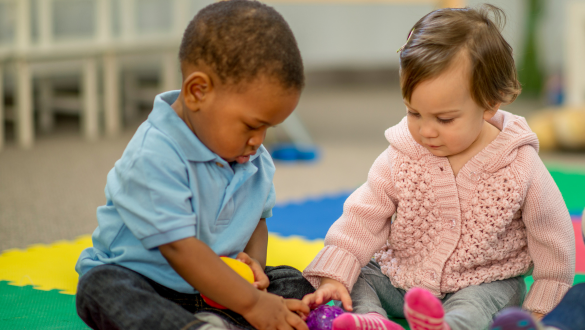
Associative play
- Starts at around three years
- Involves children starting to interact with each other whilst playing but the interactions are limited.
Examples include: playing together in the water play area but all engaging with various aspects.
Cooperative play
- Starts around four years
- Involves children playing in the same activity and equally participating, sharing ideas and involving each other during the play.
Examples include: playing in roleplay together, taking on various roles in the same narrative and pretending with the same ideas in mind.
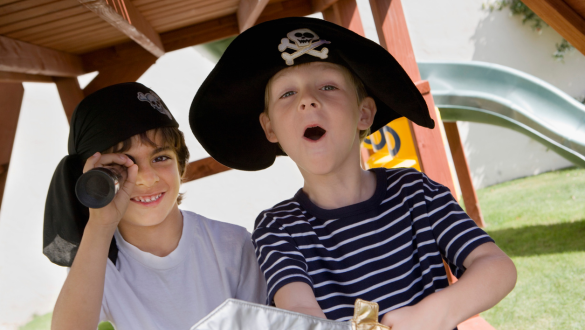
So, play is powerful. But how do we make our early education and care provision as playful as we can?
Let’s have a look at some ways to develop playfulness into every opportunity…
Transitions
In early education and care, transitions can refer to many different points in time when children experience change. It's often referred to the move to a new room within the setting or into school. Here, however, we are focusing on the everyday transitions, such as at handover in the morning, moving for a nappy change or hand wash, getting ready for the garden… the list goes on! These are often time-pressured parts of the day deemed to meet a specific need, but by making a little bit more time for these important parts of the day and incorporating play into them, we can make it easier to engage children to cooperate with what is needed.
Some suggestions might include:
- counting steps on the way to the garden
- play a treasure hunt to find items of clothing for post-nap dressing
- sing songs to encourage tidying up before food.
Process-based crafts
There remains a debate amongst the workforce regarding how we organise craft activities for young children. Whilst instruction-based play has its place for developing organisation and communication skills, it is important to give children the space to be curious and creative by their own means.
Process-based craft involves giving children the resources with no agenda or aim attached to their activity. What they create is up to them and how long they spend engaged is down to their choice. Incorporating process-based crafts into your activities allows for children to become more playful with the artwork, to explore and experiment in their own unique way, producing something meaningful and individual to them.
Be silly with language
We know that play has an extraordinary impact on our ability to problem-solve and communicate effectively, which is why it is important to utilise playful engagement in our language development. Not only does a playful environment promote positive engagement with language, it also builds confidence in communicating and experimenting with vocabulary and it helps to develop stronger resilience for making mistakes when it comes to formal schooling later on.
Some ways to be silly might include:
- Encourage silly rhyming of made-up words. Recognising patterns in language is an incredibly valuable skill for acquiring vocabulary later on.
- Use various forms of playful language, including through songs, rhymes and books to expose children to as many forms of language in the most playful ways.
- Just as with transitions, explore ways to gamify language everywhere you go. How many things can they spot in the garden beginning with a ‘t’?
Use all our senses
Play is powerful because of its versatile nature – everything can be playful if we try! Sensory play as an area of learning is a valuable way to explore with young children for many reasons, but utilising different senses as a method to play, rather than the activity itself, is equally as valuable.
Keep things fresh by using a variety of senses in play. For example, drawing pictures in sand rather than with pens, listening to the sounds that musical instruments make in the garden instead of the playroom or following a dramatic journey through space as we move in different ways to wash our hands for lunch.
The power of play is paramount
Play is paramount to lifelong learning, healthy development and happy selves. There is a growing recognition for the role that play takes in our lives, from early childhood through to our later years.
Not only does play give us the foundations to grow but it keeps us engaged and revitalised throughout life’s ups and downs, and plays an important role in regulating children’s emotional wellbeing as well as their capacity to soak up all the learning that takes place in the early years.
Let’s play our cards right! All our learning in early education and care should be play-based in one way or another, so why not check out some of our early learning member resources to see what you could try?


